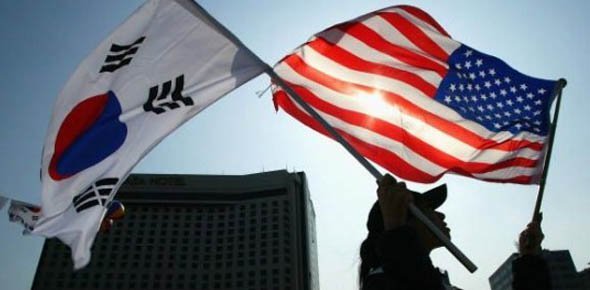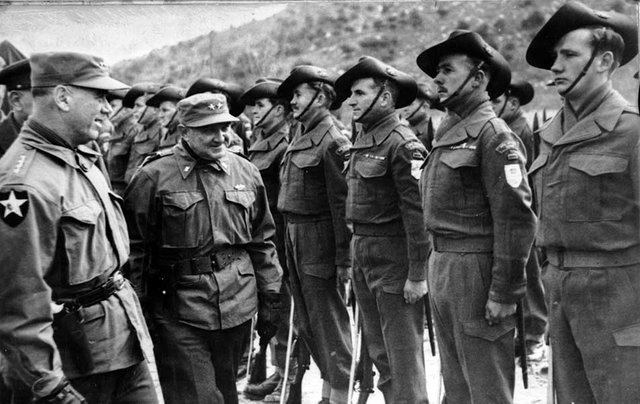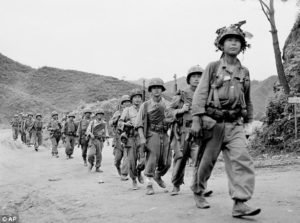Historical Essay: To what degree did the American interventions affect the Korean War?
Source
Introduction
In the recent, South Korean President Moon Jae – in and one of the ruling Kim’s leaders of the North, Kim Jung – unmarked a first historic meeting to stabilize and establish an authentic everlasting peace zone in the Korean Peninsula, a most awaited moment after decades of undeniable tensions and a history of conflict – long years of divisions or separations that occurred since World War II ended. The Korean War, which has been often called as a “Forgotten War”, was largely ignored by the American public while it was fought and destroyed millions of lives - both military and civilian. (Yonghee Suh n.d.) Peace and prosperity should have been observed after the Second World War, however, the two leading power blocks in the Western hemisphere, namely the USA and the USSR created tensions that characterized Cold War Politics. There were various formulations of foreign policies established by the United States, alarmed to the spreading of ‘communism’ by the Soviet Union in both Asia and Europe. On the other hand, the emergence of communism in the Eastern Europe made America to be much particular in her foreign policies in Asia against the ‘containment of communism’ as a result; the Korean War became the first site of the major battle suppressing the expansion of communism. (Social Education 2016)
But to what extent did the US interventions affect the Korean War?

Source
At the end of the World War II, the Korean Peninsula was split into two regions with separate governments – the Northern half is a communist while the US anti-communist government occupied the Southern half, divided at the 38th parallel. (The Korean War:1950 - 1953 n.d.) Prior to the division was a colonial administration of Imperial Japan which lasted from 1910 to 1945 until Japanese armies north arbitrary of the 38th parallel surrendered to the advancing Soviet forces and those in the South to the US forces. Allies promised Korea its independence. Supposed, Southern Korea would not gain little aid and support from the US given that it wasn’t really strategically essential and vital to the latter. In fact, before the Korean War broke out, General MacArthur after the re – conquest of Seoul, through his disobeying wilfulness made him crossed the division and pursued the North Korean army in the hopes to reunify Korea. But what happened was, ever since 1948 the USA begun withdrawing its troops in the Korean soil even if it backed Syman Rhee’s government and by 1950’s Secretary of State’s David Acheson’s claimed that United States would not defend Korea from any communist attack. (Social Education 2016)
But above all these paradoxes, what really driven the need for United States to intervene in the conflict between these divided territories in Korea?

The major factors to be established in these seeming pendulums of decisions by USA for Korea were: The burgeoning extension of communism, to be exact, when China became a Soviet Satellite of USSR in Asia. Mao Zedong’s Chinese Communist Party won and officially declared that China would ‘lean to one side’ and established relation to Soviet Union in the 30th day of June, 1949. (Makhasian 2001) It should be noted that USA, throughout the Civil War, had given military assistance to nationalist party led by Chiang Kai Shek but the success to unify China was achieved by the CPP. As a result, President Truman gained internal criticisms in the home government regarding to his commitment as anti – communism, doubts over the amount of military assistance given by the US for the nationalist party. Other undeniable causes were, when Soviet Union conducted the first nuclear test on atomic bomb, in a response to end USA’s monopoly on the weapon and Soviet Union’s intervention to Greece and Turkey lead to the creation of further USA’s foreign policies with the purpose to counter Soviet’s geopolitical expansion of communism – the Truman doctrine and Marshall Plan. All of these, formed anxieties and insecurities for USA to secure and defend non-communist government and pursue its goal to officially intervene in the Korean War. Capitalist US couldn’t allow losing another independent nation and falling in the hands of the Communist.
Although there were already series of encounters between the combatant of the north and south across the 38th parallel for nearly two years, 25th of June 1950 was officially the first day of the Korean War. (Casey 2008) USA’s intrusion in the war is commonly characterized as a “police action” since Truman had no formal declaration of War in congress upon the presence of the combined military of UN forces and the dominant US armies in the Korean peninsula. (Social Education 2016) This war was perceived by the US as a plot of Soviet Communist to take over the world for the former gave much immediate military response even if short delays and uncertain changes of command were to be observed. It is, therefore, a threat among the capitalists to the point that Great Britain made a little participation and set aside its small conflict with US. Foreign policies were the usual initial indications of USA towards intervention in supporting anti – communist government but its role in Korea did not just limit to that, perhaps, it supplied economic and military aid after its troops had departed in South Korea.After an atomic bomb devastated Hiroshima and Nagasaki which obviously affected Japan and its imperial colonies, the Allies also began advancing in the North while the US, in the South. The War broke out, the North Korean troops continuing to occupy south directly towards Seoul because of that, US was to be expected to use air and naval power against the North Koreans but would still remain below in the 38th parallel. (Casey 2008) The issue had been brought to Security Council by Truman and Acheson, as result; a resolution was adopted that deplored the North Korean invasion. It desired to end hostilities and withdrawal of the Korean forces in the 38th parallel and the necessity of urgent military measures and assist South Korea to repel attack and restore peace. (Casey 2008) Although there was a collective security supported by Truman and Acheson, however it seemed instead, that USA used UN as a tool in achieving American interest than international peace.
(1).jpg)
Source
If American interference is to be discussed, there was much military assistance that was undeniably necessary brought by this Ally power, the air and naval power and the deployment of troops – combined military from other countries which mostly outnumbered the American and Korean armies. The government of People’s Republic of Korea was recognized by the Soviet Union while the Republic of Korea of the Southern portion wasn’t still recognized by the USA whose leader was Syman Rhee. (Pratt 2006) The desire of Syngman Rhee to unify Korea just leads to the flagging South Korean military since US was also guarded that too much production of weaponry might enable him to conspire a war. This attack brought by the North Koreans was labelled by the UN as ‘breach of peace’, which in accordance to UN ideals the worst war crime to be committed. (The Korean War:1950 - 1953 n.d.) The Soviet Union insisted that the crisis was a civil war, it was an inner struggle of a nation that UN didn’t have to interfere with it. Furthermore, the surprise attack held by the North Koreans, according to the pro – communist people, was an avenge after General MacArthur had was once pursued Inchon or what happened was a Stalin’s plot to measure the possible response of US towards these actions committed by the Soviet Union in trying to expand communism in East Asia.
Conclusion
If the probability of USA’s intervention is to be measured, it indeed had much affect the Korean War. Early years, prior to the crisis, USA already organized a massive rearmament program in strengthening and making its military well – equipped to possible aggressions of communist attacks. In fact, over 150 million dollar aid bill was dragged by the US congress just to aid Korea (Makhasian 2001) There were not just US military troops that were sent, but since it was an international struggle, United Nation forces were included too which more likely to be Americans in composition and its Allies other nations under the organization sent armies too. Accordingly, the Korean War was one of the first instances that UN could be used by USA, that this international peace keeping force can be manipulated by US and NATO anti – communist interests. (Social Education 2016) Supposed, South Korea wouldn’t have an access US military aid since , in the beginning, Americans perceived it as not as essential and vital to them however the atmosphere during Cold War driven the need to US to counterpart and block Soviet Union’s Communist expansion in Asia. Yet it was also realized through Gen. MacArthur that it could be a strategic protectorate in the Far East. Through this intrusion brought by the US, even in the early years before the crisis, it gave further divisions and bitterness among the southern and northern Koreans. The limited war engaged by the Americans, triggered the Northern Korea and the Soviet Union to wage attacks either response to the early attacks by the US to unify Korea or a response to determine the strength of the US towards communism.The Soviet Union let the Northern Korea chose the future of their government while the Southern Korea in the hands of the US didn’t. Finally, if the US intervention affected the Korean War, the Korean War also affected the US as much as US it affected the War, to the point that USA has to undergo a huge amount of military expenditures for its rearmament just to support Southern Korea. The Korean War viewed a clear cut of threat to the USA because it has been alarming that if the entire Korean peninsula would fell into the hands communist government, then the entire mainland East Asia will be controlled by the communist which is an indication of tremendous boon for the Soviet Union.
Bibliography
Casey, Steven. Selling the Korean War: Propoganda, Politics, and Public Opinion 1950 - 1953. New York: Oxford University Press, 2008.
Makhasian, Carter. Essential Histories: The Korean War 1950 - 1953. Great Britain: Opsrey Publishing, 2001.
Pratt, Keith. Everlasting Flower: A History of Korea. London: Reaktion Books Ltd, 2006.
Social Education, the Journal of the National Council for the Social Studies. US Enters the Korean Conflict. September 7, 2016. http://www.US Enters the Korean Conflict _ National Archives (accessed April 30, 2018).
The Korean War:1950 - 1953. n.d. http://www.sparknotes.com/history/koreanwar/terms (accessed May 05, 2018).
Yonghee Suh, Makito Yurita, And Scott Alan Metzger. What do we want students to remember about the “FORGOTTEN WAR”? A Comparative Study Of the Korean War as depicted in Korean, Japanese, and U.S. Secondary School History Textbooks. n.d.
Posted from my blog with SteemPress : http://zam398.vornix.blog/2018/08/08/historical-essay-to-what-degree-did-the-american-interventions-affect-the-korean-war/



Congratulations @zam398! You have completed the following achievement on Steemit and have been rewarded with new badge(s) :
Click on the badge to view your Board of Honor.
If you no longer want to receive notifications, reply to this comment with the word
STOPTo support your work, I also upvoted your post!